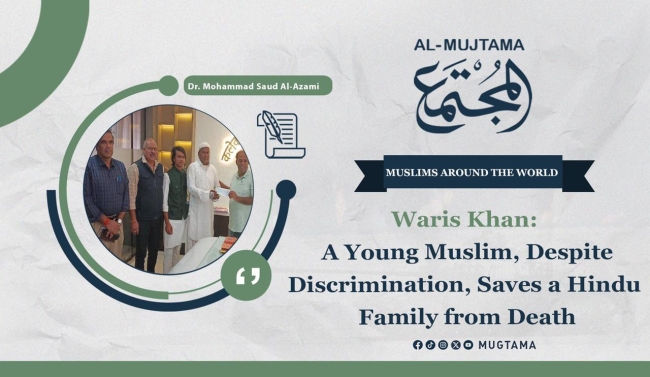Waris Khan: A Young Muslim, Despite Discrimination, Saves a Hindu Family from Death Featured
In a time when sectarian tensions, division, and violence prevail in India, some stories emerge that restore hope in humanity's ability to overcome all divisions. One of these inspiring stories is the story of the young Muslim man, Waris Khan, who proved that human values are capable of surpassing any religious or cultural differences. In a dramatic incident on the highway in Bhiwandi, Madhya Pradesh, Waris Khan saved the lives of 7 members of a Hindu family, making him a true symbol of national unity and human solidarity.
The Heroic Incident
Waris Khan, a simple plumber, was riding his motorcycle on his way to Bhiwandi when he witnessed a car accident involving a family of 7. The overturned car became a nightmare for the family, as its doors were completely shut, making it impossible for the passengers to escape. Out of innate bravery and humanity, Waris immediately intervened, using his bare hands to break the car window and help all the passengers out, ignoring the personal danger he faced.
What makes this act even more impactful is that Khan did not hesitate for a moment to intervene, even though he did not know the people he saved and did not belong to their religion. This behavior showed that human values should be the basis for interactions between people, not religion or cultural backgrounds.
Reactions
This heroic act received widespread appreciation on both the popular and official levels. The Chief Minister of Madhya Pradesh, Dr. Mohan Yadav, praised Khan's courage and announced a financial reward of 100,000 rupees in appreciation of him. Additionally, the government decided to award Khan the Medal of Bravery in the upcoming Independence Day celebrations on August 15, 2025.
This official recognition served as a strong message reinforcing human values and solidarity at a time when India is suffering from escalating sectarian rhetoric that threatens social peace.
Humanity in the Face of Sectarian Politics
In recent years, India has seen an increase in political rhetoric that seeks to exploit religion to deepen divisions in society. Some politicians try to scare people with messages like "if you divide, you will kill," exploiting sectarian tensions for political gains. These messages aim to portray certain communities, especially Muslims, as a threat to the nation.
However, Khan's story came to refute these claims, offering a living example of humanity that transcends all divisions. His rescue of a Hindu family from certain death proves that Muslims and Hindus in India are not inherently enemies but brothers living in the same country, sharing its hopes and challenges.
History of Coexistence
India has long been known for its cultural and religious diversity, with Hindus, Muslims, and other communities coexisting peacefully for decades. However, some political and media forces seek to exploit this diversity to achieve narrow objectives, threatening social fabric.
In the face of this trend, stories like Khan's show that common values among people are stronger than any attempts at division. Good deeds and cooperation in difficult times are the foundation for building strong and prosperous communities.
While voices of hatred rise in some circles, the Indian society still needs to rethink its priorities. Everyone must realize that discrimination based on castes and religions does not serve the nation, but weakens it. The story shared by Khan is a strong reminder that Muslims and Hindus in India are not enemies, but brothers in this country. Just like a body, if one part suffers, the rest of the body responds, and when one member of the community suffers, whether Hindu or Muslim, their suffering is the suffering of all. Therefore, we must overcome the divisions sown by some among us, and understand that we are all part of the same nation that we must work together to elevate and prosper.
Politicians who promote divisive policies should understand that these policies cannot persist in the face of figures like Khan, who show a real example of human solidarity and prove that good deeds have no religious or racial boundaries. They show that love and cooperation between Hindus and Muslims are not just an option, but the right path to building a strong and united society. Figures like Khan do not need honors or awards to prove their worth, but the recognition he received from the Chief Minister of Madhya Pradesh indicates that we are beginning to appreciate actions that unite us rather than those that divide us. The Indian people, from all communities, must remember that good deeds are what build nations, and that religious discrimination only brings weakness and division.
It is time to rebuild bridges between Indian communities. We must learn that India can be a model for the world in peaceful coexistence between religions if we are willing to let go of concepts of hostility and hatred. We must draw inspiration from Khan's work, which has shown that humanity is the link that should connect all of us. In the end, we must understand that truth lies in actions that benefit everyone, and that a nation that seeks unity and cooperation remains strong and stable. The Indian society must realize that discrimination between Hindus and Muslims, or between any group, does not strengthen the nation but weakens it. There is an urgent need to change mindsets and rebuild a culture based on love and cooperation instead of hatred and disintegration.
This story presents a real example that humanity transcends all religious and ideological boundaries. Khan is not only a hero in this incident, but a symbol of hope at a time when the nation needs to renew the concept of national unity. Let us all be brothers, stand together against hatred, and work on building a society that does not differentiate between its sons based on religion or race.


